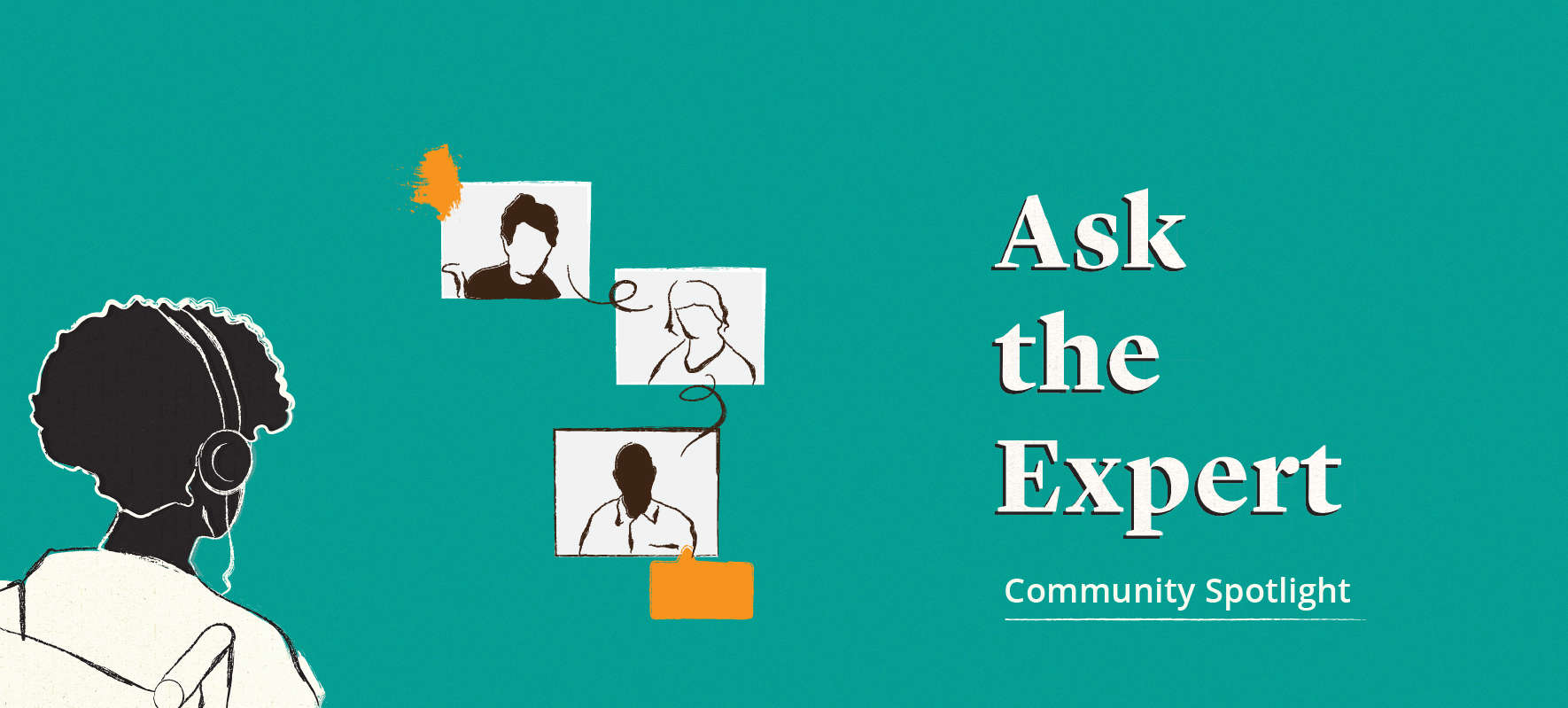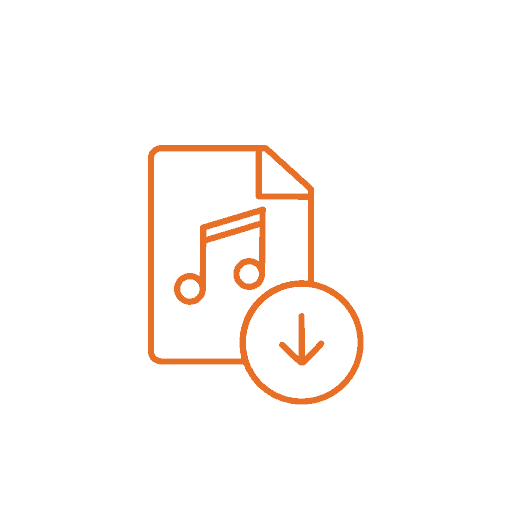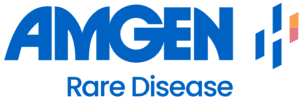Voices of SRNA Volunteers, Part 1: Alexandra Goulimi and Angela Jackson
April 8, 2024
The “Community Spotlight” edition of the “Ask the Expert” podcast series shares the stories of our community members. In this episode, Alexandra Goulimi and Angela Jackson joined Lydia Dubose of SRNA share their backgrounds and how they got involved with volunteering for SRNA [00:01:43]. Alexandra and Angela discussed their experiences with rare neuroimmune disorders and the support they found through SRNA’s programs [00:13:41]. They also shared what they hope to see in the future related to rare neuroimmune disorders and SRNA [00:22:53] and offered advice for anyone who might be interested in getting involved [00:30:51].
Transcript
[00:00:02] Lydia Dubose: Hello and welcome to the SRNA “Ask the Expert” podcast series,
“Community Spotlight.” This podcast is titled, “Voices of SRNA Volunteers.” My name is Lydia Dubose, and I moderated this podcast. SRNA is a nonprofit focused on support, education, and research of rare neuroimmune disorders. You can learn more about us on our website at wearesrna.org.
[00:28:04] Our “Ask the Expert” podcast series is sponsored in part by Amgen; Alexion, AstraZeneca Rare Disease; and UCB. For this podcast, we were pleased to be joined by Angela and Alexandra. You can view their full bios in the podcast description.
[00:43:07] It’s great to talk with you both today. Welcome to this “Community Spotlight” podcast focused on volunteers. For just a little bit of background before we get the discussion going, I just wanted to mention that every year in the month of April, we celebrate Volunteer Appreciation Month, and this year, we really want to highlight our volunteers because SRNA was founded as a volunteer-run organization, and it was run and operated by volunteers exclusively for many years. And then today, volunteers continue to be a big part of what we do at SRNA and making our work possible. So, I want to first say thank you for volunteering, and second, thank you for joining us today.
[00:01:36] Angela Jackson: My pleasure.
[00:01:38] Alexandra Goulimi: Yeah, great to be part of that. Yeah.
[00:01:43] Lydia Dubose: Yeah, let’s start with some introductions. If you would like to share where you’re from and how you first got connected to SRNA. Alexandra, would you like to go first?
[00:01:56] Alexandra Goulimi: Yeah. I’m living in Greece, in Patras, and I was diagnosed with NMO, neuromyelitis optica, in 2017. And that’s when I discovered SRNA. It was then the Transverse Myelitis Association, and it was out of my research, out of my internet research, because I felt the need to understand what was going on. And the more I learned about it—and SRNA helped me a great deal with learning about it, I mean, very much—the more I learned about it, the less threatening the disorder felt. So, I ate up all the information I could get, and I felt more comfortable with what was going on with me. So that’s how I found out about SRNA, and step by step, I joined the support group meetings, which were also very helpful, and where people shared their experiences and their journeys and stories and so on and so forth.
[00:03:23] Lydia Dubose: Awesome. Thank you. And Angela, how about you? Where are you from? How did you first get connected to SRNA?
[00:03:31] Angela Jackson: I am from Houston, Texas, but I was born in Oklahoma—in Tulsa, Oklahoma, and went to school in Norman, Oklahoma—then moved to the Dallas area, and now we’re settling down in the Houston Metroplex. I found out about SRNA when I went to see Dr. Greenberg for a visit, and after we went through all of the x-rays and discussions about where I was, the progress that I was having with the other physical therapy, he invited me to join the SRNA, and he gave me the background on it, and I reached out to one of the coordinators of the meetings. His name was Jeremy. And from there, I’ve been involved with SRNA.
[00:04:42] Lydia Dubose: Great. Thank you. So, I wanna dive in and talk a little bit about some of the different activities that y’all have been involved in with SRNA. And so, for people who maybe aren’t familiar with these programs, I’ll ask each of you to describe them a little bit. Angela, can you describe the Peer Connect program for anybody who’s not familiar and what your involvement in it has been?
[00:05:10] Angela Jackson: Sure, I got involved with SRNA and the Peer Connect, I think, Lydia, right after you all implemented it, I volunteered to participate in it. And what happens is that Lydia gets information about a person that wants to talk to somebody, that wants to relate to someone that has the condition that they have and feel more comfortable with where they are, like next steps, and some personal information. Personally, I think they want to know for themselves, “What’s next?” and “Will it get better?” And so that’s what I like about the Peer Connect. We help one another as well because it helps me to be able to talk to that person and explain what happened to me. And then they don’t feel alone after that. They feel like they’ve connected to someone, and then the dialogue continues to open, and then we—it’s just, I think we help one another in that process.
[00:06:44] Lydia Dubose: Yeah. And what drove you to—from initially getting diagnosed, learning all you can about TM and rare neuroimmune disorders, getting connected to SRNA—what took you on your journey, or what happened on your journey that made you interested in getting a little bit more involved?
[00:07:05] Angela Jackson: Well, first of all, I retired from a full-time position, and then it was during the COVID season. So, the meetings had stopped. And so that was one of the main drivers to participating, is that it gave me something to do and the ability to stay connected with the Peer Connect program.
[00:07:37] Lydia Dubose: That’s great, thank you. Alexandra, can you describe support groups for anybody who’s not familiar with support groups and how you’ve been involved with them?
[00:07:48] Alexandra Goulimi: Yeah. It is a group of individuals who share basically the same concerns. They may not have been diagnosed with the same disorder, but they share the same concerns and many times the similar, should I say, similar symptoms. And what is offered, sometimes, it’s just a few practical things that you might learn, something that someone talks about, it helped them. It’s not medical advice, but you just hear that, “Oh, for someone this or that helped,” and it’s just an idea.
[00:08:38] And the other thing is that by understanding the other, you understand yourself better as well. But what is important for me or what I have noticed in the support group meetings is that there is still joy of life no matter if you have a disorder or not, or no matter if it can get really difficult at times. There’s still joy, and there are other people who deal with similar issues, and it makes you feel less isolated or less alone, and that’s something that is very comfortable. It’s just this human communication to have with someone who has similar concerns is comforting.
[00:09:41] Lydia Dubose: Yeah. And thank you so much, Alexandra. Angela, I know you’ve also been involved with our Walk-Run-N-Roll events. Can you describe what those are for anybody who’s not familiar?
[00:09:55] Angela Jackson: Well, yes. We get together, and we have a plan on inviting people that have rare neuroimmune disorders to participate in a walk. And also, we’re fundraising and having awareness of creating awareness of SRNA, what our goals are, and where we want to be with the community and connecting with the community. So, from my point, I solicited people to donate to our cause. And it was tracked on the website, which gave me visibility of how much more work I had to do. If the dollars weren’t going up, then I got a little bit busier with that.
[00:11:08] It’s a joy to see everybody come together. I had support from Lydia and her team and my family. The day of the event, I had my sisters and husband, and friends show up, and the community showed up. It was rewarding to see that, and it was really rewarding to see how everybody connected with each other. They were happy to talk to one another. They weren’t afraid to go to the next person and talk to them, introduce themselves, and then we had games where you could play. And that also helped with the “getting to know you.” We had Dr Fletcher. Is that correct? She spoke, and that gave more information to the people that were attending, including myself. And Lydia gave an overview of all of the neuroimmune disorders that we work with, or, I would say, that we try to raise funds for under the SRNA umbrella.
[00:12:43] We had a wonderful walk. It wasn’t that far. The park is dedicated to accessibility. So, for us, that meant a great deal because there are people in the community that are in wheelchairs or on canes or walkers. And they also had—I’m gonna call it a playground—where, from kids to adults, they could actually go and experience the fun of being in a park. So that was also rewarding. So, my goal this year is to try to enhance that and continue to grow and help out.
[00:13:41] Lydia Dubose: Wonderful. Thank you. And you spoke really well about the rewarding side of putting on a Walk-Run-N-Roll event. And so, Alexandra, I’ll ask you next. What has been rewarding out of being a part of support groups? What benefits has it had for you to be a part of it? And how has it been a support in your life?
[00:14:09] Alexandra Goulimi: Yeah. The fact that by sharing my experience, there is a possibility and chance for someone else to benefit from that. I guess for me, that’s a driving force because there will always be different journeys for different people with disorders with this and with that, but to be able to make the best out of it, really, and to not get stuck with the problems or the difficulties that a disorder may cause, but to go beyond that, and to see that, “Okay, I have been maybe through A, B, C, D, F, G, but I have learned this and this and this and this, and I can give it back. I can help someone else, maybe, to have an easier time with what they are going through.” So, this is for me, I guess, the most rewarding part of it. If even one person says, “Oh, great! Yes, that was empowering. What I heard her say was really empowering.” Well, then I feel that I have done my job.
[00:15:37] Lydia Dubose: That’s awesome. Yeah. And same for you, Angela. What’s the most rewarding part about the Peer Connect program? What has come out of that for you?
[00:15:48] Angela Jackson: I would say that the ability to help someone get past grieving what they’ve lost because they’ve been diagnosed with a neuroimmune disorder and letting them know that they’re not alone. Some of the ladies didn’t feel like ladies anymore because of some of the things that they lost. So, encouraging them to go back to loving themselves and not focusing on the grief so much, and they’re related to me because I can tell them that I cried for three weeks. I couldn’t talk on the phone to anyone. My husband had to take over. So, you do grieve, but let’s get out of that. Try to get out of that place and love ourselves again. Try to, if you need help, ask for help. And it helps me to see them when they actually breathe and say, “Oh, I’m so glad that I talked to you. I’m so glad that, or can we talk again sometimes?”
[00:17:17] I’ve had seven or eight Peer Connects, and I had one that—we talked for months, and then some of the others, they just wanted an initial conversation to understand what’s going on and just know that they’re not alone. So, it’s a diverse crowd, too. It went from a young lady in her 20s to another woman that was in her late 60s. So, we get to talk about the differences in, “Did this happen to you at this time frame?” and “Believe it or not, yes, we have, we have, we had the same type of situation and had to deal with it.” So yeah, just promoting self-love and letting them know that SRNA, we’re here to support them in any way we can.
[00:18:27] Lydia Dubose: That’s awesome. It’s great to find those commonalities between each other, even if there may not be anything else in common that you have. But you can relate on this note. I want to ask y’all—you’re a part of the SRNA community, and you’re part of SRNA’s volunteer community. So, what does being a part of this community mean to you? Alexandra, would you like to speak first?
[00:18:57] Alexandra Goulimi: Yeah. It means for me that I have learned to even love myself more than I did. Anyway, it’s a process that is not stagnant; it’s evolving. So, yeah, when I listen to other people’s stories, to other people’s journeys, what I recognize every time is that it’s about loving again, or despite all difficulties. It’s about loving the body or for what it is able to do at any given time, even after having gone through a relapse or whatever the case may be.
[00:19:55] And that’s something that kind of pops up for me every time that—it goes back to that; you have no other choice than just loving the body the way it is and not… to quit… I forgot the verb. Quit comparing with what it used to be like because that’s not the case, and it’s not the way it used to be. It’s a new situation. It’s a new state of the body, and just to love that and to accept that, that’s something that I gain. I benefit from when I hear from other people’s journeys. And I hope that I can transmit that, too, to others. That they can find a stronger self of a stronger sense of self-love and especially a stronger sense of loving their bodies.
[00:21:19] Lydia Dubose: Yeah, that’s beautiful. Angela, how about you? What does being a part of this community, the volunteer community, and the SRNA community mean to you?
[00:21:32] Angela Jackson: It means that I have access to resources, and I don’t go out on the website as much as I should. But when I need something, I can go out there and find it, and it helps me a lot, and it helps me work with the women that I’ve talked to during the Peer Connect. It’s also helpful to me. Just knowing that I, too, have somebody to go to is very meaningful for me. That helps me a lot. So that’s what it means to me.
[00:22:21] Lydia Dubose: Yes, great.
[00:22:22] Alexandra Goulimi: Yeah. What I just wanted to say is that what Angela just said: “meaningful.” I guess that’s the keyword, “meaningful.” It’s exactly what this is, and to be a part of this community and to be a part of these activities and, in my case, specifically, a part of the support groups.
[00:22:53] Lydia Dubose: Yes. Yes. Thank you. It is so meaningful. And it’s wonderful that you both have found so much meaning in being a part of it and in being a part of it in different ways, too. So, thinking about the future. We’re doing a lot this year with looking back and then looking forward. So, we’ve looked back at some of the ways that you all have been involved. But I wanna ask you both, what do you hope to see for the future related to rare neuroimmune disorders? And what do you hope to see for the future of the programs and activities that you’ve been a part of, specifically? Angela, would you like to go?
[00:23:44] Angela Jackson: Sure. After participating in the Walk-Run-N-Roll event, I would like to increase participation in that. That’s a goal. And I’m sure with your help and your team’s help, we can get more participants than we had last year. I would like for us to be able to have public service announcements and also have TV commercials. I know we’re growing, and we’re getting there. But I would like to see that in the future, and as being a volunteer, we don’t have, like, if I wanted to go solicit from someone, I would like to have a little card or something that said that I was with the SRNA organization. And because, if I’m asking for funds or food, I would like to leave something with them. And if we could have a printable card that we can print off of the computer to take with us when we go talk, that’s a goal for me as well. But outside of that, that’s all I can think of right now.
[00:25:22] Lydia Dubose: No, that’s great. That’s great. How about you, Alexandra? What do you hope to see in the future?
[00:25:27] Alexandra Goulimi: Yeah, I would like to see the research continue because I think that’s really incredibly important to better understand the causes of these disorders and how to treat them more efficiently. And what I would wish for also is for milder, less toxic treatments and cures. That would be one part, and the other part would be I would like to see as well more participation in the groups, more people who come together and share their stories and give each other the possibility to learn. And I would like to see more people who are happier with what happens or what happened to them or what is going on in their lives.
[00:26:43] Angela said earlier, she talked about grief, and I would like to see the grief replaced by acceptance and still gratitude. I would really like to see that because I think it’s a matter of perspective. It’s a matter of mind, right? Because if you focus, it’s a question, “What do I focus on? Do I focus on what I lack, on what is not there, or do I focus on what is possible at this particular moment? It’s possible. And I’m maybe not able to move this way or that way but look at what I’m able to do.” I would like to see that kind of shift, let’s say, and to have the support group meetings—people, yes, who have gone or who are going through these disorders, but who also feel that they have moments of fulfillment and happiness and joy. That’s what I would wish for.
[00:28:04] Lydia Dubose: That’s great. Thank you so much.
[00:28:06] Angela Jackson: Lydia, can I add one?
[00:28:08] Lydia Dubose: Yeah, go ahead.
[00:28:09] Angela Jackson: For me, I would like to participate in a research study, and I know there’s one out on the website that doesn’t require me to be in the Dallas area. So, I’ve already requested medical records and gotten a disk and everything. I think I’d like to get a little bit deeper into what’s going on with transverse myelitis the best way that I can. And also, I’d like to start attending seminars. So last year we had conflicts. Hopefully, this year I can move forward and come to a seminar or two.
[00:28:53] Lydia Dubose: I hope so, too. We’d love to see you there. Those are great things. For anybody who might be curious about getting more involved or volunteering, but they feel apprehensive or they’re not sure what to expect, what advice would you have for somebody who wants to get more involved? Alexandra, would you like to share?
[00:29:20] Alexandra Goulimi: Yeah. Make that step. You won’t regret it. It’s rewarding, and it’s enriching to meet all these people. And the people from SRNA are very, very supportive. I mean, you will find open ears, many, many open ears, no matter what it’s about. And this is, to get together and to offer each other what we have to offer it enriches the communication; it enriches our spirit. I don’t want to get by any means romantic or spiritual or anything, but it’s just, I mean, what else do we have? Yeah, the benefit from our communication and from sharing our stories, and that’s great. And the more people are involved with it, the better it is, the more enriching it gets, the more inclusive it gets. I mean, diverse people and include them all. That would be perfect if that could happen.
[00:30:51] Lydia Dubose: Absolutely. Angela, any words for somebody who might be interested in getting more involved?
[00:31:00] Angela Jackson: I would say, take the step and look forward to meeting interesting people, and don’t hesitate. Don’t be apprehensive about it. You’ll be nervous but go ahead and take that first step and talk to people. It helps you, and it helps the other people that will be involved in the conversations that occur. And then it’s always good information that comes out of those support meetings. I mean, somebody can tell you about a prescription drug that they’re taking or why they had to stop taking a particular drug or where you can exercise, and it’s just resourceful and informative and fun. So, take that step.
[00:32:04] Lydia Dubose: Excellent. Well, we’re coming to the conclusion of our conversation here. And it’s been really, really nice chatting with both of you and getting to know a little bit more from your perspectives. But before we close, is there anything else that you would like to share with the SRNA community or whoever might be listening to this?
[00:32:27] Angela Jackson: I just want to say thank you. It’s helped me a lot being a part of the SRNA community, and I look forward to the future. Every time I get notifications about growth and releases on the website, I know that SRNA is moving forward and that will be beneficial to everyone that participates.
[00:32:57] Alexandra Goulimi: Yeah. And I would also like to express my gratitude for this amazing, amazing work that SRNA is doing. It’s so important that the existence of SRNA and the kind of support it offers—not only support, education—it’s so incredibly important, the education and the information that people can get. It’s empowering, it helps them really to understand their condition, to understand themselves, and to feel that, “Okay, I can stand on my own feet, and I understand what is going on with me. It’s not a kind of—it’s not enigmatic what is going on. I know it is called this, this, this, or that kind of rare neuroimmune disorder. But, I mean, it’s not threatening, it’s not some kind of monster. It’s something that’s just another reality.” And that is a huge part that SRNA is offering: education, information, and support, and I’m incredibly grateful for that.
[00:34:24] Lydia Dubose: Well, thank you so much and I’m grateful for both of you, not only for sharing today a little bit about yourselves and your experiences, but also for participating in all of the different programs and activities that you’re a part of with SRNA. Thank you for giving your time. Thank you for being open to sharing. It’s because of people like you that we can even do all of the great work that we’re doing. So, I want to thank you again. And I’m looking forward to all of the great things that we will continue to create and do together.
[00:35:05] Alexandra Goulimi: Yeah, exactly. I’m looking forward, too. And it’s a pleasure to be involved with all of you. I thank you, Angela, and Lydia, and all of SRNA, and everyone that is part of the support groups.
[00:35:26] Angela Jackson: Well, thank you. And it was wonderful meeting you, Alexandra.
[00:35:33] Announcer: Thank you to our “Ask the Expert” podcast sponsors: Amgen; Alexion, AstraZeneca Rare Disease; and UCB. Amgen is focused on the discovery, development, and commercialization of medicines that address critical needs for people impacted by rare, autoimmune, and severe inflammatory diseases. They apply scientific expertise and courage to bring clinically meaningful therapies to patients. Amgen believes science and compassion must work together to transform lives.
[00:36:07] Alexion, AstraZeneca Rare Disease is a global biopharmaceutical company focused on serving patients with severe and rare disorders through the innovation, development, and commercialization of life-transforming therapeutic products. Their goal is to deliver medical breakthroughs where none currently exist, and they are committed to ensuring that patient-perspective and community engagement are always at the forefront of their work. UCB innovates and delivers solutions that make real improvements for people living with severe diseases. They partner with and listen to patients, caregivers, and stakeholders, across the healthcare system to identify promising innovations that create valuable health solutions.
LISTEN & SUBSCRIBE
TO PODCAST
DOWNLOAD MP3
DOWNLOAD TRANSCRIPT












